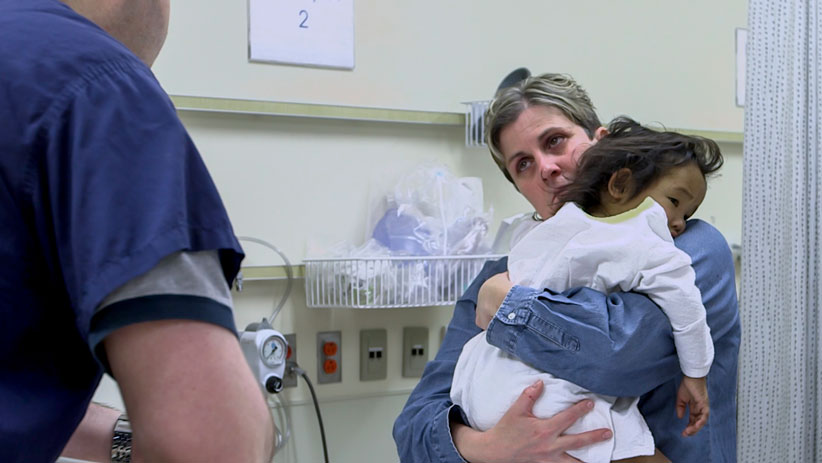An ‘impossible’ choice, made: An Ontario twin gets her liver
What some called an unimaginable choice became real, as Michael Wagner donated part of his liver to one of his daughters, while the other waits
Living donor liver transplant. Michael Wagner donates liver to one of his twin daughters, Phuoc Wagner. Courtesy of SickKids & UHN
Share

At best, Michael and Johanne Wagner had hoped for a little publicity, anything to help draw attention to the plight of their ailing daughters. What happened instead is still difficult for them to fathom. “I would like to thank everyone who has chosen to support us in this journey—worldwide,” Johanne said on Thursday, facing a packed press conference at Toronto’s Hospital for Sick Children. “It was quite a surprise to see how viral our story went.”
That now-familiar story began in 2012, when the Kingston, Ont., couple—already the parents of seven children (five biological, two adopted)—travelled to Vietnam to adopt two more orphans: twins Phuoc and Binh. Eighteen months old at the time, the girls were so sick, so emaciated, that their new parents weren’t sure they would survive. Once in Canada, doctors confirmed the diagnosis: Alagille syndrome, a rare genetic disorder that attacks the liver, among other vital organs.
By their third birthday, it was increasingly apparent that without transplants, both girls would die.
Never the types to sit idly by, the Wagners launched a Facebook campaign to appeal to potential donors. But their story really began to spread at the end of January, when doctors confirmed that Michael’s liver was a match. Though wonderful news for a desperate family, it also raised the obvious question: Which daughter should Dad save? (Donors only have enough liver to help one recipient, not two.)
An “impossible choice,” headlines proclaimed. Heart-wrenching. Agonizing.
In truth, the choice was quite clear—and certainly not one that would be left in the hands of a distraught parent. Specialists at SickKids conducted a “complex” medical assessment on both twins, concluding that Phuoc, not Binh, was in more immediate need of her dad’s liver. “We make a team decision and definitely include the family in the discussion as well,” said Dr. Binita Kamath, a hepatologist at SickKids. “But we don’t burden the family with that discussion. That decision, it’s ultimately our decision.”
Even Johanne seemed to downplay the widely reported suggestion that she and her husband were somehow left with an unimaginable choice. “We knew from the beginning that the two of them would not receive [a liver] at the same time, and we were fine with that,” she said during the press conference. “We are very confident that Binh will get her turn, and at the same time extremely grateful that Phuoc got hers.”
In the end, Binh may not be the only one who gets her turn. The Wagners’ story has been shared so much on social media that more than 400 people have volunteered to be potential donors for the second twin, including one from as far away as New Zealand. Officials are hopeful that some of those altruistic strangers will agree to help some less-publicized patients. (Unlike those who register to be organ donors after they die, “live” donors are able to choose the recipient.) “I would like to thank the very courageous people who have come forward,” Johanne said, amid the sound of clicking cameras. “I’m hoping once this ordeal is behind us, and once Binh has received her precious gift, that many of those courageous souls will opt to leave their name there and volunteer to be anonymous donors for all the people who are on the list waiting for an organ: the mothers, the fathers, the sisters, the brothers, the children—all those people who are just as equally important as my daughters.”
As for Binh, doctors are optimistic a new organ is imminent. Dr. Gary Levy, who oversees the live liver-donor program at Toronto General Hospital, said several volunteers have already been shortlisted and the ideal candidate should be identified in the next two weeks, with surgery soon to follow. “We anticipate it will occur within the next month, maybe earlier, but we don’t want to give a specific timeline,” he said. “We are certainly not going to jeopardize the health of that child, and the precious gift that is being offered.”
In the meantime, doctors will continue to keep a very close eye on Binh’s sister. On Tuesday, surgeons at Toronto General removed 10 to 15 per cent of Michael Wagner’s liver—which was then carefully packaged, on ice, and carried across the street to SickKids, where a separate team of doctors sewed the organ into Phuoc’s body. Both procedures were deemed a success, but staff must monitor Phuoc’s condition to ensure her system doesn’t reject the new liver. It could be weeks, if not months, before she returns home to Kingston.
As for Dad, a Canadian Army major who served in Afghanistan, he remains in recovery, where he is expected to stay for another week. Like all donors, his liver will eventually grow back to its original size, but he will need at least three months of healing before he can return to duty. “I saw him this morning, he sends his greetings,” Levy said. “He is doing extremely well.”
Of the many people Johanne singled out during the press conference—donors, doctors, the military, the Vietnamese community, her other seven children—she saved her most heartfelt gratitude for Michael. “I would like to give a very special thank you to my partner in crime, my best friend, my hero, the best person, the best man I know out there: my husband,” she said. “Thank you, Michael, for offering the best present ever to our daughter. There is no price to that.”